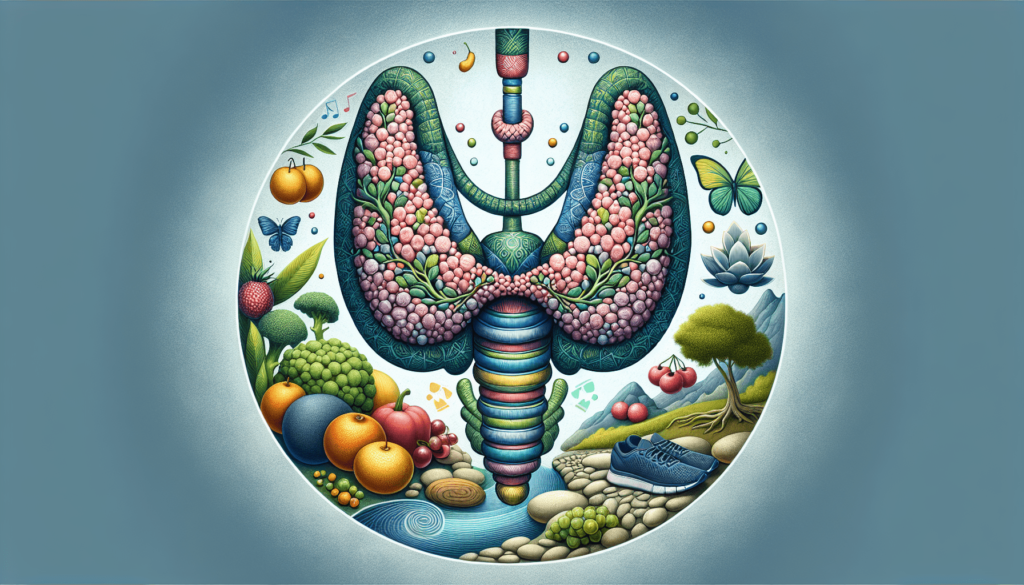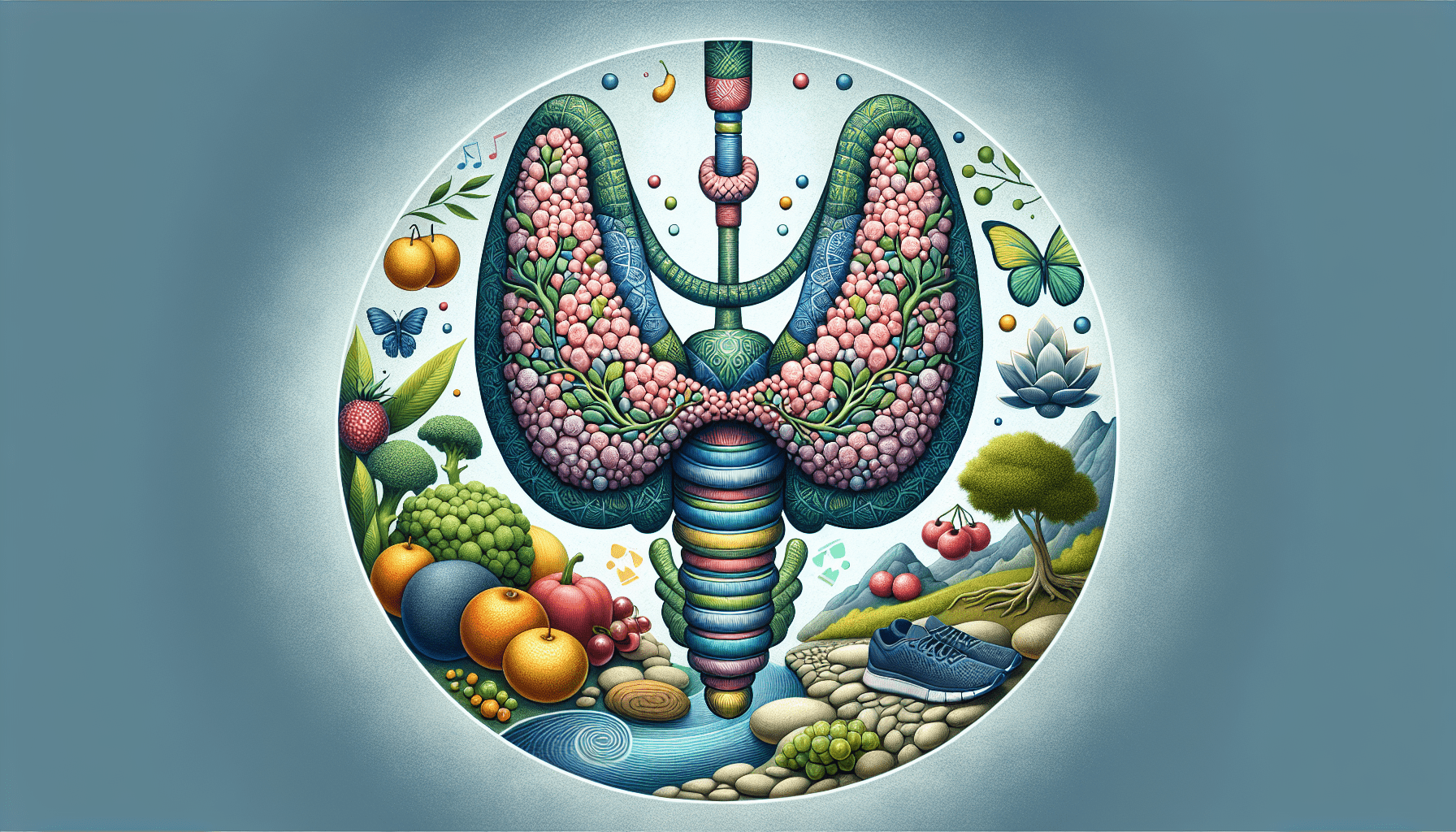In your journey towards maintaining a healthy thyroid, “Key Strategies for Preventing Hypothyroidism” will be your essential guide, offering practical tips to support your well-being. You’ll discover how a balanced diet, regular exercise, and mindful stress management can play significant roles in staving off this common condition. By following these simple, yet effective strategies, you’ll be empowered to take proactive steps to keep your thyroid functioning at its best, ensuring you maintain optimal health and vitality. Have you ever wondered how to keep your thyroid healthy and prevent hypothyroidism? If you’re like most people, the thyroid gland might not be at the forefront of your daily concerns. Yet, this small butterfly-shaped gland located in your neck plays a significant role in your overall health. Thyroid hormones influence nearly every organ, and when these hormones are out of whack, your whole body feels it. Hypothyroidism, or an underactive thyroid, can lead to fatigue, weight gain, depression, and a host of other issues.
What is Hypothyroidism?
Hypothyroidism occurs when your thyroid gland doesn’t produce enough thyroid hormones. These hormones are crucial for regulating your body’s metabolic processes. If your thyroid doesn’t release sufficient quantities of these hormones, you may experience a slower metabolism, affecting everything from your heart rate to your body temperature.
Symptoms of Hypothyroidism
Before diving into the prevention strategies, it’s essential to understand the symptoms of hypothyroidism. Knowing what to look for can help you catch issues early. Some common symptoms include:
- Fatigue: Feeling unusually tired or sluggish.
- Weight Gain: Unexplained weight gain despite a stable diet and exercise routine.
- Cold Sensitivity: Feeling unusually cold, especially in your extremities.
- Dry Skin and Hair: Skin and hair may become brittle and dry.
- Mood Changes: Depression, anxiety, and other mood disturbances.
- Memory Issues: Difficulty remembering things or concentrating.
Understanding these symptoms helps you recognize when something might be off, acting as an early warning system. Let’s now delve into the key strategies that can help you prevent hypothyroidism.
Maintaining a Balanced Diet
A well-balanced diet plays an essential role in maintaining thyroid health. There are several nutrients which are particularly beneficial for ensuring your thyroid functions properly.
Foods Rich in Iodine
Iodine is a crucial element for thyroid function. Your thyroid gland uses iodine to produce thyroid hormones. Here are some iodine-rich foods you might incorporate into your diet:
| Food Item | Iodine Content (µg per serving) |
|---|---|
| Seaweed | 20 – 2,000 |
| Cod | 99 |
| Yogurt | 75 |
| Milk | 56 |
| Iodized Salt | 77 per 1/4 tsp |
Selenium-Rich Foods
Selenium is another mineral that supports thyroid health. It helps convert inactive thyroid hormone (T4) into its active form (T3). Consider including the following selenium-rich foods in your diet:
| Food Item | Selenium Content (µg per serving) |
|---|---|
| Brazil Nuts | 68 – 91 per nut |
| Tuna | 92 |
| Eggs | 20 |
| Sunflower Seeds | 45 |
| Turkey | 31 |
Zinc for Thyroid Health
Zinc also plays a pivotal role in thyroid function. You can find zinc in:
| Food Item | Zinc Content (mg per serving) |
|---|---|
| Oysters | 74.0 |
| Beef | 7.0 |
| Pumpkin Seeds | 2.2 |
| Chickpeas | 1.3 |
| Fortified Cereals | 3.8 |
Iron and Thyroid Function
Iron is essential for the synthesis of thyroid hormones. Lack of iron can interfere with thyroid function. Foods rich in iron include:
| Food Item | Iron Content (mg per serving) |
|---|---|
| Spinach | 3.6 |
| Lentils | 6.6 |
| Red Meat | 2.6 |
| Fortified Cereals | 18 |
| Tofu | 6.7 |
A balanced diet rich in iodine, selenium, zinc, and iron helps ensure your thyroid gland has all it needs to function properly.

Regular Physical Activity
Engaging in regular physical activity not only keeps your body fit but also supports thyroid function. Exercise stimulates the production of thyroid hormones, increases tissue sensitivity to these hormones, and aids in the conversion of T4 to T3.
Types of Exercises for Thyroid Health
You don’t have to be a gym fanatic to reap the benefits. Moderate activities like walking, swimming, or even yoga can do wonders for your thyroid. Here are a few exercises you can consider:
- Cardio Workouts: Walking, running, or cycling can help improve your metabolic rate.
- Strength Training: Lifting weights or doing resistance exercises can help build muscle, which in turn can boost your metabolism.
- Yoga and Pilates: These exercises can help manage stress, another factor that can impact thyroid health.
Stress Management
Stress can wreak havoc on your thyroid function. High stress levels stimulate the production of cortisol, a stress hormone that can interfere with the production of thyroid hormones. Cortisol can also make it harder for your body to convert T4 into its active form, T3.
Techniques for Reducing Stress
Managing stress effectively can thus play a crucial role in preventing hypothyroidism. Here are some stress management techniques you might find helpful:
- Mindfulness and Meditation: Spending a few minutes each day to meditate can help lower stress levels.
- Breathing Exercises: Practicing deep breathing techniques can help you calm down almost instantly.
- Journaling: Writing about your day or your thoughts can be incredibly therapeutic, helping you process emotions and reduce stress.
- Time Management: Organizing your day can help you stay on top of tasks and reduce the feeling of being overwhelmed.
- Hobbies and Leisure Activities: Engaging in activities you enjoy can serve as a great distraction and mood-lifter.

Avoiding Environmental Toxins
Exposure to certain toxins and chemicals can affect thyroid health. Common environmental toxins that can interfere with thyroid function include:
- Pesticides: These can impact thyroid hormone production.
- Perchlorates: Found in fireworks, rocket fuel, and some fertilizers, can disrupt thyroid function.
- BPA (Bisphenol A): Commonly found in plastics, can mimic the activity of estrogen, disrupting thyroid function.
How to Reduce Exposure
Reducing your exposure to these toxins can significantly help in maintaining thyroid health. Here are some tips:
- Choose Organic Foods: Organic products are less likely to contain harmful pesticides.
- Filter Your Water: Using a water filter can reduce your exposure to perchlorates.
- Avoid Plastic Containers: Opt for glass or stainless steel containers to store food and drinks.
- Read Labels: Be mindful of the cleaning products, cosmetics, and other household items you use. Look for those free from harmful chemicals.
Regular Health Check-ups
Regular health check-ups can help catch thyroid issues before they become serious. It’s easier to treat and manage thyroid conditions when they’re diagnosed early.
What to Expect During a Thyroid Check-up
A thyroid check-up typically involves:
- Blood Tests: To measure your levels of TSH (Thyroid Stimulating Hormone), T3, and T4.
- Physical Examination: Your doctor might check for physical signs like swelling in the neck.
- Imaging Tests: Such as an ultrasound if any irregularities are found during the physical exam.

Awareness of Family History
Knowing your family history can also be crucial in preventing hypothyroidism. If you have a family history of thyroid disorders, you’re at a higher risk. Being aware allows you to take preventive measures more proactively.
Discussing Family Health History
Having conversations with your family about health issues might not be the easiest topic, but it’s valuable information. Discussing family health history can provide crucial insights into what you might expect and how you can take preventive steps.
Supplements and Medication
Sometimes, despite your best efforts, diet and lifestyle changes might not be enough. In such cases, supplements or medications can provide the extra support your thyroid might need.
Common Supplements for Thyroid Health
| Supplement | Recommended Daily Allowance |
|---|---|
| Iodine | 150 µg |
| Selenium | 55 µg |
| Zinc | 8-11 mg |
| Iron | 18 mg (women) / 8 mg (men) |
| Vitamin D | 600-800 IU |
Before you start taking any supplement, it’s advisable to consult with a healthcare provider. They can guide you on whether you need them and the appropriate dosage.

Avoiding Smoking and Excessive Alcohol
Certain lifestyle habits like smoking and excessive alcohol consumption can negatively affect thyroid health. Smoking introduces toxins like cyanide into the body, which can interfere with iodine absorption and thyroid function. Alcohol can reduce the thyroid’s ability to produce hormones effectively.
Eliminating Harmful Habits
If you smoke or consume alcohol regularly, consider reducing or completely eliminating these habits. It might be challenging, but there are numerous resources available to help you quit smoking and reduce alcohol consumption. Support groups, counseling, and even medications can provide assistance in overcoming these habits.
The Role of Probiotics
Gut health also plays a crucial role in thyroid function. An unhealthy gut can contribute to inflammation and autoimmune responses that may impair thyroid function.
Incorporating Probiotics into Your Diet
Probiotics are beneficial bacteria that support a healthy gut. Foods rich in probiotics include:
| Food Item | Probiotic Content |
|---|---|
| Yogurt | 1 billion CFUs or more |
| Kefir | 15-20 billion CFUs |
| Sauerkraut | 10-20 billion CFUs |
| Kimchi | 5-10 billion CFUs |
| Miso | 5-10 billion CFUs |
By including probiotics in your diet, you can support your gut health, which in turn can benefit your thyroid function.
Sleep Hygiene
Good sleep is often an underrated aspect of maintaining thyroid health. Poor sleep can lead to hormonal imbalances, including those affecting the thyroid.
Tips for Better Sleep
Here are some simple tips to help you improve your sleep hygiene:
- Consistent Sleep Schedule: Go to bed and wake up at the same time every day.
- Limit Screen Time: Reduce exposure to screens at least an hour before bedtime.
- Create a Relaxing Bedtime Routine: Activities like reading, listening to calming music, or bathing can help you unwind.
- Avoid Stimulants: Try to avoid caffeine and heavy meals close to bedtime.
Hydration and Its Importance
Staying well-hydrated is also vital for thyroid health. Water helps in the efficient transport of hormones in the bloodstream.
Hydration Tips
Ensure you’re drinking enough water throughout the day. The general recommendation is to drink at least eight 8-ounce glasses, which equals about 2 liters. However, individual needs can vary based on factors like climate and physical activity.
Educating Yourself
One of the best strategies to prevent hypothyroidism is to continually educate yourself. The more you know about thyroid health, the better equipped you are to take preventive measures.
Reliable Sources of Information
Books, reputable health websites, and consulting healthcare professionals can provide you with accurate information. Avoid relying on anecdotal evidence or unverified sources, as misinformation can lead to harmful practices.
Conclusion
Preventing hypothyroidism is a multi-faceted approach that involves a combination of diet, lifestyle changes, regular check-ups, and staying informed. By incorporating these key strategies into your daily routine, you can significantly reduce your risk of developing hypothyroidism. Remember, your thyroid might be small, but its impact on your health is enormous. Taking steps to maintain its health can lead to a better quality of life overall. So, why not start today? Your thyroid will thank you, and so will your future self.
